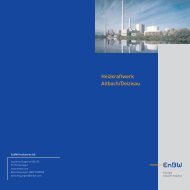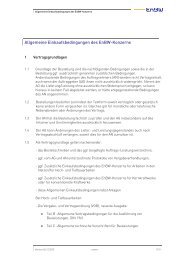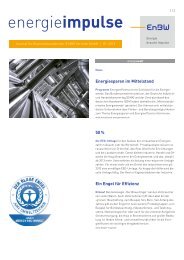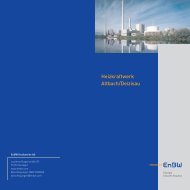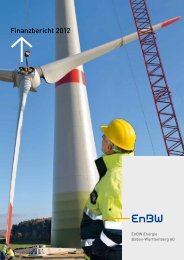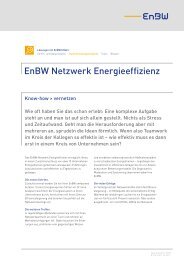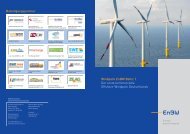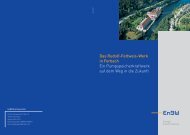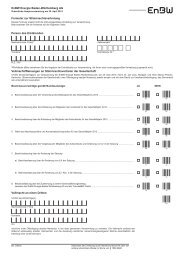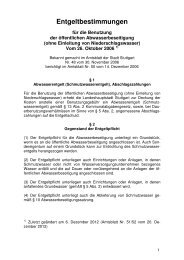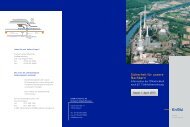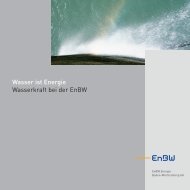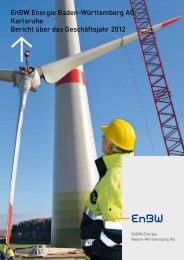2008 I 2009 Sustainability Report - Econsense
2008 I 2009 Sustainability Report - Econsense
2008 I 2009 Sustainability Report - Econsense
Create successful ePaper yourself
Turn your PDF publications into a flip-book with our unique Google optimized e-Paper software.
Research and innovation<br />
The Research and Innovation unit is busy<br />
developing new techniques and processes<br />
along our entire value added chain – complete<br />
with the corresponding application options<br />
at the customer end. The topics range<br />
from more efficient power plants with lower<br />
CO 2 emissions, international climate protection<br />
projects and the development of new<br />
sources of energy to intelligent electricity<br />
networks (smart grids) and options for the<br />
optimisation and use of geothermal heating<br />
and fuel cells. At EnBW, research and development<br />
are based on a holistic approach designed<br />
to encompass all options on the road<br />
to sustainable energy supply.<br />
In <strong>2008</strong>, four of our research projects were<br />
presented with awards. In the same year, we<br />
also registered over ten patents – all of them<br />
relating to inventions in the field of renewables<br />
and intelligent electricity networks.<br />
The strategic core function of research and<br />
innovation is based at the Holding company.<br />
At the end of <strong>2008</strong>, the unit comprised 19<br />
employees, mainly engineers, natural scientists<br />
and economists. Alongside this core<br />
unit, there were also numerous undergraduates<br />
and placement students who were<br />
writing their thesis in this field. The core<br />
team also comprises around 130 additional<br />
employees at the EnBW subsidiaries who<br />
develop and pursue innovative projects and<br />
products in their respective fields. Overall,<br />
we spent 28.9 million € on research during<br />
the year under review ; the figure for 2007<br />
was 32.4 million €, also due to the start-up<br />
costs of various projects and activities.<br />
We are still adhering to our decision not to<br />
operate our own laboratories but to concentrate<br />
on our own innovations during the phase<br />
from development to application. Within<br />
the area of fundamental research, we cooperate<br />
with renowned scientific institutes;<br />
when it comes to newly developed products,<br />
we implement our ideas in a hands-on environment<br />
in cooperation with the industry<br />
and our suppliers either in-house or on the<br />
premises of our customers and partners.<br />
Our most important external research and<br />
innovation partners are the scientific institutes<br />
in Baden-Württemberg, in particular in<br />
Hohenheim, Karlsruhe and Stuttgart. Close<br />
ties also exist with universities and research<br />
institutions in Aachen, Berlin, Cottbus,<br />
Darmstadt, Düsseldorf, Cologne and Munich.<br />
EnBW has also stepped up its cooperation<br />
with the European Institute for Energy<br />
Research (EIfER) founded in 2001 by EDF and<br />
the University of Karlsruhe: in <strong>2008</strong>, there<br />
were a total of 29 joint projects, most of<br />
them focusing on decentral energy supply,<br />
energy technology for urban conurbations<br />
and the effects of climate change in the region.<br />
<strong>2008</strong> Annual <strong>Report</strong>, p. 76 et seq.<br />
and the <strong>2008</strong> Innovation <strong>Report</strong>,<br />
p. 70 et seq.<br />
The MeRegio model project –<br />
the intelligent network<br />
Picture a plug socket that recognises when<br />
electricity is particularly cheap and then<br />
switches on the washing machine. Vision or<br />
reality? EnBW launched a pilot project with<br />
the name MeRegio (Minimum Emission Region)<br />
in <strong>2009</strong> to make this vision a reality.<br />
The aim is to show, together with various<br />
partners in industry and research, that the<br />
intelligent combination of technical energy<br />
management and innovative information<br />
and communication technologies (ICT) can<br />
pave the way for significantly increased energy<br />
efficiency – in all areas along the energy<br />
value added chain. The key elements in this<br />
endeavour are the sustainable choice of<br />
technology in the area of generation, customer-focused<br />
and legally compliant energy<br />
markets and an overriding ICT infrastructure<br />
that allows optimum integration of<br />
existing and new energy supply units while<br />
directly integrating customers in the energy<br />
markets in years to come.<br />
The MeRegio project supported to the tune<br />
of around 10 million € by the German Ministry<br />
of Economic Affairs under the "E-Energy"<br />
programme focuses on three aspects:<br />
cost efficiency, supply reliability and environmental<br />
soundness. In the first phase, an<br />
infrastructure system is being created in the<br />
form of a model region as the necessary basis<br />
for the further activities of all the partners<br />
involved in the process. During the subsequent<br />
phases, the participants will be<br />
integrated through the step-by-step creation<br />
of the regional energy marketplace. Alongside<br />
EnBW, the other equal partners in the<br />
project are the companies ABB, IBM, SAP and<br />
systemplan GmbH as well as the Karlsruhe<br />
Institute for Technology (KIT).<br />
27



